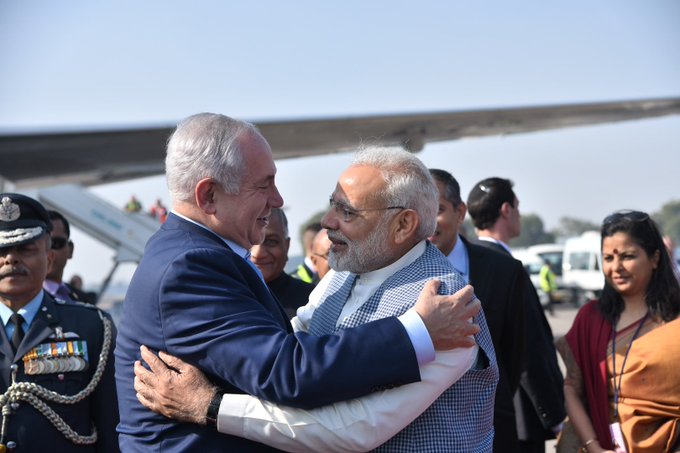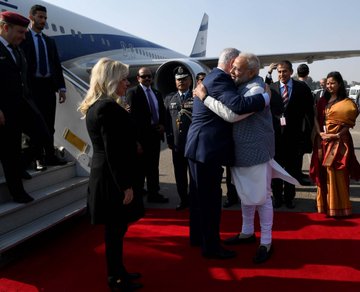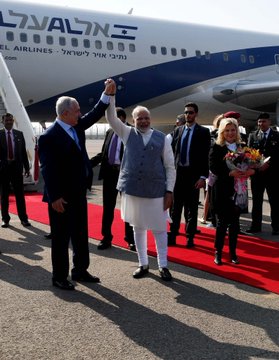Netanyahu calls India – Israel relations a ‘marriage made in heaven’. For the arms trade and public relations, it certainly is. But as Modi won’t betray the Palestinians or renounce the Iranians, it resembles more an open marriage – and that might be far less sustainable.

‘De-hyphenate!’
That’s the word being used to describe India’s nimble delinking of bilateral relations with Israel and with Palestine. And that potential victory of political pragmatism, if not gymnastics, will be on full display this week, as Israeli Prime Minister Benjamin Netanyahu meets Prime Minster Narendra Modi, as part of a six-day tour of India.
Netanyahu’s visit is the sibling of Narendra Modi’s July 2017 visit to Israel (and their prior meeting at the UN General Assembly) during which Modi didn’t visit Palestine. The increasing closeness between the leaders, at least in front of the cameras, illustrates what many describe as a tectonic shift in diplomatic relations between India and Israel.
But the Palestinian issue hasn’t disappeared; Iran is still a stumbling block; and the two countries’ mutual interest in outsized weapons deals plays a critical role in relations. Not that you’d pick that up at all from the flowery language used by Modi and Netanyahu – and that’s deliberate and calculated, from both sides.
Modis visit to Israel, the first ever by a serving Indian Prime Minister, was hailed as historic a ‘momentous’ celebration of India-Israel diplomatic relations. Headlines screamed: “Israel rolls out red carpet for PM Modis historic visit.”
For Modi, as with his other trips abroad, it was an opportune moment to present himself as a leader of global significance, not least to a domestic audience.
In India, what ensued was a public relations blitzkrieg. Social media networks and Indian newspapers and television channels were fed with innumerable videos of Israelis welcoming Modi. Several more craven media networks reported the minutest trivia of the trip with great adoration – from what the Indian PM wore to what he ate; how he was received by the Israeli establishment to the hugfest between the two leaders.

“Shalom,” said Modi, “Namaste,” said Netanyahu to cheering crowds and clicking smartphones.
All the necessary props – the stroll along Olga beach, dipping their bare feet in the Mediterranean; the drive in the water desalinization buggy; meeting with Moshe, the 11-year-old boy who survived the terrorist attack in Mumbai, now living in Israel as is the nanny who rescued him; the Israeli restauranteur who cooked Modis favorite meal, and many others – were carefully used to showcase his visit as a diplomatic victory and a celebration of India-Israel ties.
Keen to build economic and strategic ties with India (the world’s fastest growing economy) and to signal a diplomatic victory against the Palestinians at home, Netanyahu went a step further. Addressing a gathering, Netanyahu accelerated this budding bromance by calling it a “marriage made in heaven.” Earlier that year, Netanyahu had used the same comment to flatter the Chinese premier Xi Jing Ping.
Modi and Netanyahus penchant for wordplay made the media rounds too. While Modi came up with “I4I” (India for Israel and Israel for India), Netanyahu came up with “I4F” (Israel India Innovation Initiative Fund), a $40 million fund for ‘research and development in innovation.’ Though it allocated only a paltry sum of $4 million a year, it made front-page news.
Reciprocating Modis visit in July, Netanyahu has landed in India this week on a five day tour to further strengthen ties between India and Israel, accompanied by a contingent of businessmen and journalists.
Is there more to this perfect relationship than meets the eye?
Beneath the carefully curated PR glitz that accompanied Modis trip, and will accompany Netanyahu’s, there are pragmatic realities that drive the relations between the two countries.
Arms deals are a foreign policy goldmine. To start with, it is this goldmine – the sale of weapons – that brought India and Israel together. During India’s war with China in 1962, then Israeli PM David Ben-Gurion offered his support to Jawaharlal Nehru and supplied weapons to India. In July 1971, another Israeli PM, Golda Meir, secretly supplied weapons when India was preparing for war with Pakistan.
Since then, diplomatic relations between India and Israel have seen a dramatic progress. From voting at the UN against the creation of Israel in 1947, and its ongoing reluctance to extend recognition in the early years of Israel’s independence, India has come a long way in acknowledging Israel and forming strategic partnerships.
In 1992, Prime Minister P.V. Narasimha Rao paved the way for a ‘tectonic shift,’ with the establishment of full diplomatic relations with Israel. In 1999, during the Kargil war under Atal Bihari Vajpayee’s premiership, Israel supplied India with laser-guided missiles, taking the relationship a step further.
The fact is Indias inability to build an efficient and robust indigenous defense manufacturing capability, partly due to its corrupt and dysfunctional bureaucracy, meant that it continued to be the worlds largest arms importer for nearly five years between 2012 and 2016, will little change in the near term.
A report by Indias Parliamentary Standing Committee on Defence suggests that almost 40 percent of Indias weapons are either obsolete or obsolescent. Given this, New Delhi has a desperate need to upgrade Indias weapons, not least when its hostile neighbors, Pakistan and China, have committed to a comprehensive military modernization.

This makes India a wonderfully lucrative market for Israel. Nearly half of Israels arms exports end up in India. Currently, Israel is the fourth largest supplier of arms to India after the U.S., Russia and France, and is poised to overtake them all. From Heron drones to Barak 8 air defence systems, Indias military shopping list has been ever increasing and Israel has been its preferred vendor.
If a Federation of Indian Chambers of Commerce and Industry study, predicting the Government of India is likely to spend $620 billion in buying weapons between 2014 and 2022, turns out to be true, Israel, with a major chunk of the pie, would indeed strike gold.
With Modi and Netanyahu relations going way beyond ‘coming out of the closet,’ defense deals to the tune of $3 billion have been signed, and economic diplomacy is only likely to triumph. In short, there will be more deals and more sales.
However, beyond the public relations smokescreen and the drab rhetoric of shared history, bonhomie, awkward hugs and public display of affection, pragmatic realism comes to the forefront in political diplomacy.
Despite Modis visit to Israel in July, Sushma Swaraj, Indias Minister of External Affairs reiterated, on the sidelines of the UN General Assembly in September, that “for independent India, support for the Palestinian cause has [always] been a reference point of its foreign policy.
Despite the growing proximity to the United States and Netanyahus visit to India, in December, India pressed the Yes button in the UN General Assembly, criticizing Trump’s move to recognize Jerusalem as Israel’s capital, affirming its unwavering support for the Palestinian cause, as it has for nearly seven decades.

Speaking on conditions of anonymity to the Hindustan Times, an Indian diplomat said that, “The vote was consistent with our position on Palestine historically, across governments going back decades to expect anything else – especially a no vote – would be a gross lack of awareness of Indias stand on the issue.”
This is also reflected in Indias friendly relations with Palestine. New Delhi refers to Mahmoud Abbas as President of Palestine, not of the Palestinian Authority. Indias former President Pranab Mukherjee and Indias Minister of External Affairs, Sushma Swaraj, have both visited Palestine, offering support for the Palestinian cause. Modi himself is likely to visit Palestine in the not-too-distant future.
Realpolitik also speaks not only through statements and speeches at diplomatic forums like the United Nations but also through geostrategic engagements. Indias love affair with Iran, a country that Israel is at loggerheads with, is a case in point.
India has had a long-standing relationship with Iran. This is reflected in Indias interest in developing Irans Chabahar port, considered an entrept to Afghanistan and Central Asia, by investing $500 million into building the port. The construction of a smelter in Iran by Indias National Aluminium Co., investment in an Iran-Afghanistan rail line by Indias state-run engineering company IRCON, could all be interpreted to be – borrowing Modis twitter-trending wordplay I4I – initiatives that scream “India for Iran and Iran for India.”
India has very little interest in Israels visceral antagonism towards Iran. Indian and Iranian diplomats share a quiet, behind-the-scenes camaraderie, working out the finer details of agreements that culminated in a raft of agreements signed between India and Iran when Modi made a personal visit to Iran to assure Hassan Rouhani of Indias continued support and cooperation with Iran.
India balances its openness to Iran with cordial and friendly diplomatic relations with Arab states that are both close to and enemies of Iran – and Israel: Saudi Arabia, Syria, Iraq and Yemen. Saudi Arabia is India’s fourth largest trading partner and eighth largest export market. Modis has also visited Saudi Arabia to bolster trade and security cooperation between the two countries, especially in the energy sector.
This foreign policy pragmatism is not a one-way street. Israel actively engages with China (its largest trading partner in Asia, to the tune of $11.4 billion annually), welcoming the One Belt One Road by China, (a thorny issue with India) and ignoring Indias deep-rooted concerns about Chinas growing influence in Indias neighborhood and the Indian Ocean region.
As far as the bonhomie, bromance and public display of affection are concerned, Modi and Netanyahu deserve Academy Awards for their incredible performances. We are likely to see more such performances in the days to come.
As far as the uncritical producers of this media malarkey are concerned, not least in India: too many have become, quite consciously, Modi propagandists who’ve set their journalistic critique and mission to one side in order to parrot the government line.
The question is whether, as the Israeli-Palestinian conflict heats up once more, India’s attempt to de-hyphenate between the two sides is really sustainable.
It would certainly be a triumph for Modi’s foreign policy pragmatism if India can maintain its longstanding moral support for the Palestinian cause, while simultaneously boosting the Israeli government’s narrative: that the Palestinian issue remaining unresolved hasn’t, and won’t, damage burgeoning relations with an ever-growing list of countries.
A Fellow at the University of Oxfords Reuters Institute for the Study of Journalism and an alumnus of the London School of Economics, Shrenik Rao is a digital entrepreneur and filmmaker. Rao revived the Madras Courier, a 232-year-old newspaper, as a digital publication of which he is the Editor-in-Chief. Twitter: @ShrenikRao
This article has been co-published with the Madras Courier.
Source: https://www.haaretz.com/israel-news/1.834845
[Disclaimer]













